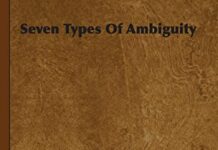
Ebook Info
- Published: 1979
- Number of pages: 280 pages
- Format: PDF
- File Size: 18.10 MB
- Authors: William Empson
Description
Reprint of the ed. published by New Directions, Norfolk, Conn. in 1961.
User’s Reviews
Editorial Reviews: Review ?A wonderfully tart and idiomatic performance… Professor Empson cannot be other than honourable, independent, and expert… on the subject of poetry.?-Guardian”A wonderfully tart and idiomatic performance… Professor Empson cannot be other than honourable, independent, and expert… on the subject of poetry.”-Guardian
Reviews from Amazon users which were colected at the time this book was published on the website:
⭐Empson’s discussion of how Milton’s apparent un-ease with the God of traditional Christianity manifests itself in an epic way. Not as impressive a work as his 7 Types of Ambiguity or Some Versions of Pastoral, but still worthy of a gander. Empson’s focus is of course on Paradise Lost, but to make his point he frequently refers to Milton’s De Doctrina and even devotes a (short) chapter to Samson Agonistes. Readers who are not easily shocked by the notion that the God of traditional Christianity is wicked, or that Christianity is a religion of systematic torture, might consider reading the last chapter, “Christianity,” first for a clearer account of Empson’s position.
⭐As best as I can remember, I read most of the Bible at age 10 (I am now 68) and became an atheist. When I was in graduate school (English), I found myself in a seminar on Milton. We were directed to review a book on Milton and present it to the class. Although the class and professor were highly esteemed, I was quickly deciding that a doctorate in English led directly to the “Night of the Living Dead.” Dejectedly wandering through the University of Washington Library stacks I chanced upon Empson’s MILTON’S GOD. After glancing through a bit of the book, I realized I had encountered a masterful icon smasher (my main goal all through my life) and seized the book with glee.When Empson identified “God” as a bully, I thought, “OF COURSE!” I felt that my atheism (never pallid or wimpy) had suddenly been turbo charged. I’ve been meaning to get around to re-reading this book for many years. As I get old, I am not sure I will actually read it againt before I die, but my intentions are bad and there is still a very warm place in my heart for it.As far as I can tell, all versions of God (which I without doubt regard as inventions of human beings) contain strong elements of bullying (though some believers are trying to clean up their act). I am glad God does not exist; if he did exist, he would clearly be a monster.When I made my report to the graduate seminar with youthful arrogance and sarcasm (a disgusting trait I have never lost), the professor stared at me aghast (with a look I can only recall as conveying “WTF . . . God, why did you throw this monster into my class?) though he said not much of anything, and actually passed me (in hope he would never see me again . . . which came true as I dropped out of grad school in disgust).However, one fellow student (obviously an evangelical Christian) looked at me with kind sadness and gently said, “If I were you, I would not be so sure there is no God.” This of course is just another formulation of “Pascal’s Wager”; the universal argument that fervent Christians like to use to scare us atheists into fearing “God the bully.”I’ve always thought, if that is what God is, it’s my duty to burn in Hell. Satan had a point, when you think about it.I am now expanding this to a “proper” review because . . . why not?I will attempt to write a “proper” review of William Empson’s MILTON’S GOD.The essential questions about religious belief in general and Christianity in particular are 1) is it true and 2 does it promote good? That is, does religion describe the nature of the universe? And does religion help us be kinder, more compassionate creatures, and does it console us with our inevitable suffering and our knowledge of our mortality?The answer to #1 is no. The universe is a meaningless accident. The answer to #2 is ambiguous.William Empson, a brilliant man who started out to be a mathematician (and showed great promise), but switched to to the study of literature, wrote a book which examined #2 and came down strongly on the side that religion is evil. Although he wrote long before luminaries of our time such as Dawkins and Hitchens, MILTON’S GOD is a seminal work in the history of atheistic thought.Context. John Milton (similar to his sometime friend, Roger Williams, the eccentric Puritan who emigrated to America) was a man who lived to early to realize that religious belief is absurd as far as truth. His instincts about the “goodness” of Christianity were correct. His struggled between his beliefs and his instincts generated one of the great works of English literature, PARADISE LOST.Empson simply assumes that religion is not true and does not discuss the issue. He focuses on the question of its virtue, and comes down strongly on the side of it being evil. If for some reason you want to get to the essence of his argument, it is contained in the last chapter of the book, titled, “Christianity.” There are many interesting insights in that chapter. I will mention one as a pertinent example. Empson discusses Orwell’s great book 1984 and points out that it is an excoriation of both Christianity and of Communism. The central question for our time is whether humanity as we try to evolve ourselves into wiser and more humane creatures can rid ourselves of the most evil traits from our past. Religious believers such as the Unitarians and the ELCA Lutherans are more tolerant than the vicious fanatics of Milton’s day. Secular enthusiasts such as the Scandinavian welfare states are more tolerant and kindly than the fanatics such as Lenin, Stalin, and Mao.To appreciate the earlier chapters of Empson’s book, it helps to have a background in the study of English literature, particularly of the time when Empson wrote his book (published in the 1960s). For example, Empson takes apart T. S. Eliot, a poet and critic who could not give up his attraction to Christianity. After disposing of critics such as Eliot and other defenders of Christianity, Empson points out that Satan is the real hero of Milton’s poem. Milton’s intuition told him that Satan was absolutely justified in rebelling against God, but his upbringing and indoctrination told him that Satan was evil. The tension between moral intuition and training fueled Milton’s talent to create a masterpiece.As he moves into discussing Milton’s portrait of Heaven, Empson points out that the interior logic of Milton’s intuition leads him to suggest that God is a usurper. From a purely Biblical point of view, this makes no sense, but as Milton lived in a time when the throne of England was in turmoil, and the “people” rose up and beheaded a king, Milton could not be anything but an interpreter of his own time as he imagined “God” the king of Heaven.When he gets to Eve and Adam, Empson intuits his way to an early feminism. Some scholars argue that very early religious beliefs (such as that in Crete) were fairly enlightened about relationships between men and women (as evidenced in Goddess worship), and were fairly tolerant and relaxed about sexuality. As religious belief was hi-jacked by nomadic warriors such as the Jews, Greeks, Persians, and Romans, religions such as Judaism, Christianity, and Islam fell under the sway of an oppressive patriarchal thinking.Empson finishes this discussion of gender relations and sexuality by talking about Milton’s portrayal of Samson and Delilah, pointing out that Samson is a crude brute and Delilah is one of the real heroes of the poem.Life is full of ironies. Milton’s God is a splendid book, but it has outlived the time when it made a lot of sense. As I am 69 years of age, I have almost outlived the time when it made sense to me. One cannot “prove” that religion is obsolete; religionists are correct in arguing that atheism (such as mine) requires as much faith as religious belief. I am scheming to convince my granddaughter (now eight years of age) that she should be an atheist by the time she is 21. As the world is in turmoil and danger, I have to have faith that she will live long enough, and the wicked race we call human will survive long enough, for her to have the opportunity to dismiss God with the contempt it deserves.
⭐Very informative
Keywords
Free Download Milton’s God in PDF format
Milton’s God PDF Free Download
Download Milton’s God 1979 PDF Free
Milton’s God 1979 PDF Free Download
Download Milton’s God PDF
Free Download Ebook Milton’s God


